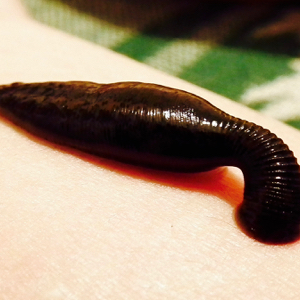The other day I fished a portion of the Wisconsin River with two of my cousins. We didn’t catch much—one pulled in a good sized carp, or sucker as they’re called up this way, the other succeeded only in catching himself on a series of rocks and holes in the river, and I contributed a thin, foot-long pike to the tally. The absence of fish was compensated by the perfection of the evening: the air was warm and slightly humid and we stood comfortably midstream in shorts and t-shirts while the setting sun slinked its way through the pines. Long shadows fell upon the cool riffling waters as herons splayed overhead and a bald eagle swung low and clawed a fish from the river a hundred feet down from where we were casting. It was just about as perfect a Midwestern night as you’re ever going to find.
As I stepped from the river I kicked off my shoes and shook rocks and sand from them. When I looked down at my left ankle I noticed a black spot on it about the size of a silver dollar. At first I thought it was a leaf and ran the bottom of my right foot across it, but the spot didn’t move. My next thought was, How did that rock get stuck to my ankle bone?, which was a thought whose absurdness I realized immediately after thinking it. I pressed at it with my shoe but it didn’t fall off, and instead it seemed to shift shapes and adjust itself around my ankle. I leaned down and pulled at it, only to find it slippery and gooey as hardening rubber. It was then I finally realized I had a leech attached to my body.
If you don’t know much about leeches here’s the long and short: they’re segmented, hermaphroditic worms that live parasitically through sucking a host’s blood. The hermaphrodite thing is totally irrelevant to this story; I just find it noteworthy anytime a species has both sexual organs. Once a leech bites into a host it emits an enzyme called hirudin that works as an anticoagulant to ensure the host will continue to bleed into the leeches’ mouth. They’ve been used medicinally for thousands of years as bloodletting was considered essential for balancing the body’s functioning. For the record, my humors are generally well aligned and I had not invited this leech to join me for health purposes. Instead, it’s likely I had picked up this freeloader while standing in one of the muckier parts of the river.
The general advice about leeches is to let them do their thing—once attached they’ll suck a hosts’ blood until they’re full, a process that can last anywhere from 20-minutes to several hours; once finished they simply detach themselves before taking a long, food-coma-induced nap. Generally I’m all for the Lion King’s notion of the Circle of Life, but this was one go-around I didn’t want to participate in, and after a momentary freak-out (There’s a leech on my leg!) I grabbed one edge of the thing and pulled. It detached in a slow, gummy suck from my skin that you can best imagine by thinking of what it’s like when you peel the mailing label from a magazine. The top part of the worm was the last to go, and as I tugged I noted a long, thin proboscis, like a tremendously small elephant’s trunk, sunk into my ankle. I threw the leech to the ground where it resided like the sputum coughed up by a miner character straight from Dickens. (That’s miner, not minor.) And that’s when I began to bleed.
That thing I mentioned earlier about the anticoagulant leeches emit after they bite? That stuff’s no joke. If I were reviewing its efficacy on Amazon I’d give it 5-stars out of 5. I bled and bled and bled. I washed the wound clean and swabbed it with a pad soaked in alcohol while a light bright stream poured from my ankle. I pressed a towel over the wound and it continued to bleed. I bandaged it with a sponge and tape and still more blood poured out. My ankle had become the leaky kitchen whose drippings you can’t turn off no matter how tightly you crank the handle.
My cousins and I eyed one another inquisitively for a good ten minutes until someone voiced the obvious—at what point will the bleeding stop, and at what point should we get really concerned? Eventually I ended up in my cousin’s truck with my foot on the dash to keep it raised above my heart, while the cut was taped and wrapped in a towel. About 20-minutes later we were home and I was finally done bleeding.
I generally don’t like concluding thoughts as they feel condescending and preachy—recall the end of Vanilla Sky where the over-explanation ruined everything that came prior to it. Still, I think it’s worth noting that you needn’t be an especially artistic or imaginative person to read this entire post about leeches as a metaphor for human relations. After all, each of us knows a leech or two who always seem to be on the hunt for another’s blood, and we also know that in order to remain healthy we need to keep our vitals to ourselves. Simply put: stay out of the muck and away from the suckers.
Beyond the metaphorical—this leech won’t keep me from fishing. I can hear my cousin packing up the gear as I write. As a concession I am packing boots and waders this trip. We’ll be on the river again within the hour. The sky’s speckled with clots of steel gray streamers and the air is thick and insulated with humidity. A storm’s coming hard and fast, and to my mind there’s no better place to be than outside when it hits.
